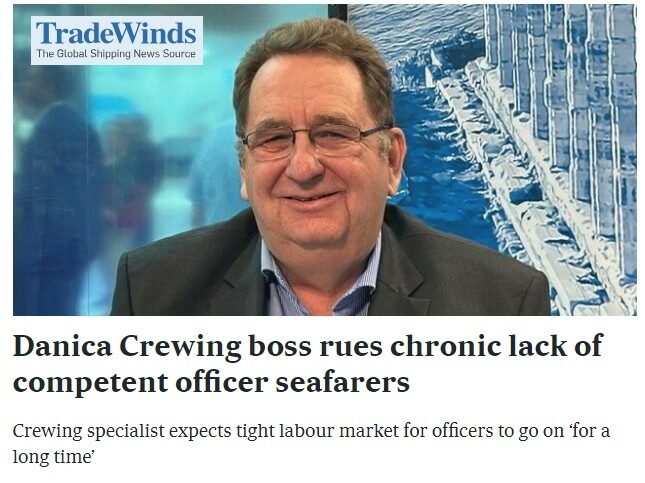Economic growth in Asia and a maritime education system failing to catch up with steadily increasing skill requirements have led to a seafarer shortage that will not be dealt with any time soon, said the head of Danica Crewing Specialists. “That will go on for a long time,” the firm’s founder and chief executive Henrik Jensen told TradeWinds during an interview on the sidelines of Posidonia.
“It’s not just the number of people you need — you also need the people with the right competencies,” Jensen said. “The situation is manageable for ratings, but for officers, there is a shortage of competent people,” he added.
When leaders in the shipping industry discuss the issue of seafarer shortages, they often attribute it to geopolitical factors. According to Jensen, however, there are other, deeper forces at play. The first is the constant rise of skill requirements set by regulators and charterers.
“You need officers of a higher calibre to deal with such things,” said Jensen, adding that modern education often neglects key aspects of seafaring. “A lot of the training is just about complying with the rules … but we need more leadership training because we also need people who can lead and think,” he said.
A more structural, long-term problem is the increasing economic growth and diversification of countries in Asia, where a large part of the seafaring population traditionally comes from. Similar to what happened in Europe decades ago, young people in these countries are often lured by alternative, onshore careers.
“That’s another risk we’re coming up against,” said Jensen. “As the middle class in such countries rises, young people get more offers in technology and the IT industry — there are many offers for young people and the competition for young talent is high,” he added.
It also strengthens the hand of those who actually choose a seafaring job. “Ninety percent of seafarers are checking the vacancies of other companies when they’re on holidays,” Jensen said. “They look around, they understand — if they see too much of a wage gap, they jump ship or they go back to their owners and say, ‘What can you offer me’?”
Shipping companies are increasingly aware of that risk and are trying to address it. According to Jensen, seafarer retention has been an increasingly important factor in ship owners’ minds lately.
Apart from altruistic considerations, that is probably also one reason why shipowners have gone to such lengths to provide relocation support for seafarer families in war-torn Ukraine. Russia’s invasion is the most common reason cited by pundits to explain the ongoing seafarer shortage.
Jensen, however, paints a much more complex picture, in which the different stages of the war have produced different effects on the maritime labour market. In the first weeks of the invasion, there was a surplus of Ukrainian seafarers, as they preferred to stay on board to avoid forced conscription. That soon turned into a shortage, however, after family members started relocating to places outside Ukraine and seafarers rushed to join them to look after their dependents’ conditions of living.
The pendulum swung back again later, as an increasing number of Ukrainian seafarers showed up for extended work to provide their families with extra financial means to settle in their new surroundings. “We have a balanced situation now, actually,” Jensen said.
The share of between 30% and 40% of Ukrainian seafarers that can not leave the country because of the war is compensated by others outside the country working more, he explained.(Copyright)
Tradewinds 13 June 2024 By Harry Papachristou in Athens





